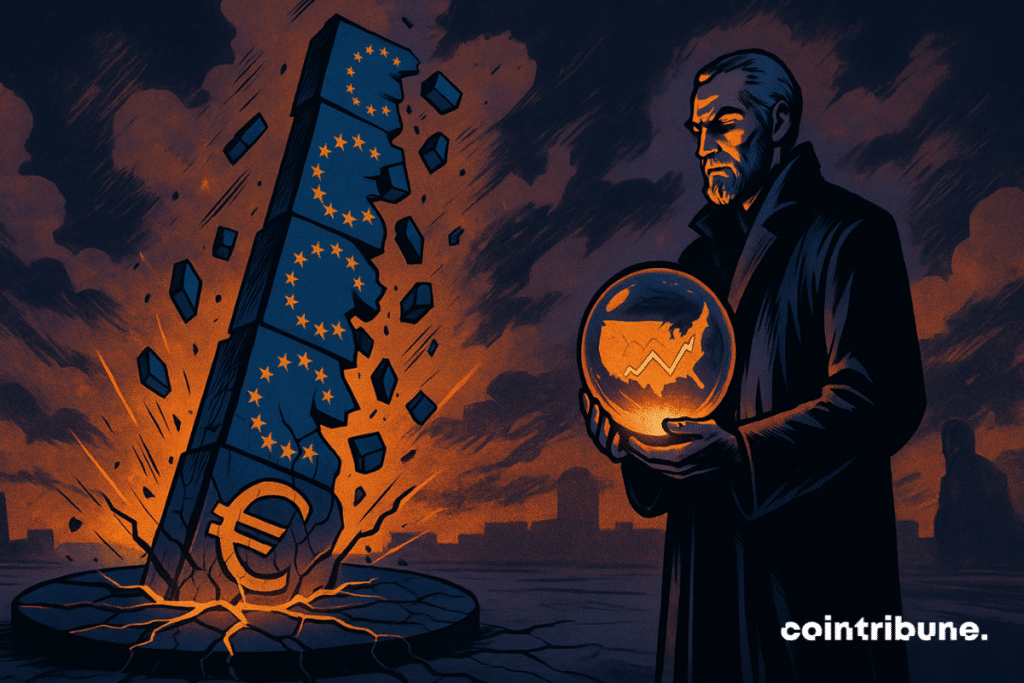Franklin Templeton Warns EU May Fall Behind In Crypto Race
Europe, once a pioneer in crypto regulation, may soon become nothing more than a corridor through which innovation passes without ever being retained. While the United States and Asia are rapidly advancing with concrete measures, the Old Continent is bogged down in caution. Catriona Kellas, legal head at Franklin Templeton, does not mince words: the EU risks being relegated to the role of a bystander, unable to compete with the momentum of major competing powers.

In brief
- Franklin Templeton warns of the risk of Europe being marginalized in the global crypto ecosystem amid the rise of the United States and Asia.
- The MiCA regulation, once seen as innovative, is already showing its limits due to a framework considered too rigid and a slow legislative process.
- Meanwhile, the United States and Asia are adopting more flexible approaches, attracting innovative projects and influencing European decisions.
- Europe’s position in global crypto governance is at stake, and its future will depend on its ability to react quickly and reinvent itself.
MiCA, a leadership already weakened
While the issuing of licenses in Malta worries regulators, during her speech at DigiAssets 2025 in London from June 17 to 18, Catriona Kellas, international legal head for digital projects at Franklin Templeton, expressed clear concern :
There is a real risk that this technology will slip away from the jurisdictions that were at the forefront just a few years ago. It is so easy to fall behind when the legislative process is too slow.
Despite the entry into force of the MiCA regulation, she warns of the possibility that the European Union may become a “flyover zone” between the United States and Asia, a space passed through but rarely chosen as a home by major innovative projects.
And while she acknowledges that Europe is still “in a good position“, she highlights that this lead could quickly turn into regulatory inertia.
The alarm raised by Kellas is not only based on a pessimistic assessment but also relies on a series of weak institutional signals, showing that the EU is beginning to react :
- Discussions are underway on a MiCA 2, indicating that the limits of the initial framework have already been identified ;
- The European Commission has used the word “competition”, marking a significant break from the usual discourse, historically more focused on stability than attractiveness ;
- The DLT Pilot Regime, in effect for a year, is already under evaluation: according to Kellas, officials are looking to “revise it to make it suitable for its purpose” ;
- Europe’s approach remains focused on the precautionary principle, but the gap widens with regions adopting more agile and experimental regulatory frameworks.
These elements show that European institutions are beginning to integrate geopolitical tensions around crypto regulation. However, the pace remains slow in a sector where technological innovation and deployment strategies evolve much faster than lawmakers.
The United States and Asia in ambush
Beyond the strictly European framework, Catriona Kellas highlights the offensive dynamic emerging across the Atlantic and in Asia. “The energy coming from the United States gives a real boost to Europe“, she emphasizes.
She sees it as a potential catalyst but also a latent danger: that major industry players might prefer more flexible jurisdictions. While the EU is barely considering a possible MiCA 2, some Asian countries like Singapore or South Korea have already implemented agile and experimental environments capable of attracting innovative companies.
This competitive pressure takes on a concrete form with the expansion strategy of giants like Coinbase and Gemini, seeking MiCA licenses via Luxembourg and Malta. These efforts aim to take advantage of the passporting mechanism, allowing operation in the 27 member states once a license is obtained in one country.
This, however, triggers concerns among some European regulators, who fear too rapid approval and heterogeneous rule application. Kellas also refers to a global shift: “what we observe is that governments are challenging their regulators to break out of traditional patterns“.
A reshaping of global balances seems to be emerging. If Europe fails to quickly adapt its approach, it could lose its role as an arbiter in international crypto discussions. However, Europe is already preparing new DeFi regulation from 2026 onwards because MiCA is no longer enough.
Maximize your Cointribune experience with our "Read to Earn" program! For every article you read, earn points and access exclusive rewards. Sign up now and start earning benefits.
Diplômé de Sciences Po Toulouse et titulaire d'une certification consultant blockchain délivrée par Alyra, j'ai rejoint l'aventure Cointribune en 2019. Convaincu du potentiel de la blockchain pour transformer de nombreux secteurs de l'économie, j'ai pris l'engagement de sensibiliser et d'informer le grand public sur cet écosystème en constante évolution. Mon objectif est de permettre à chacun de mieux comprendre la blockchain et de saisir les opportunités qu'elle offre. Je m'efforce chaque jour de fournir une analyse objective de l'actualité, de décrypter les tendances du marché, de relayer les dernières innovations technologiques et de mettre en perspective les enjeux économiques et sociétaux de cette révolution en marche.
The views, thoughts, and opinions expressed in this article belong solely to the author, and should not be taken as investment advice. Do your own research before taking any investment decisions.